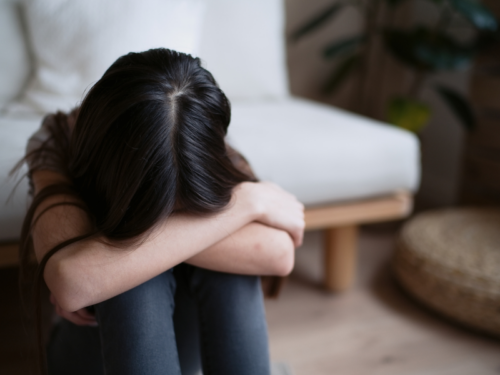
Table of Contents
What Is an Emotional Hangover? Therapists Explain What It Is and How to Cope

Written By: Ashley Laderer

Clinically Reviewed By: Dr. Don Gasparini
September 21, 2023
7 min.
Emotional hangovers refer to feelings that may happen after intense emotional events. Read on to learn more about the signs of an emotional hangover, the causes, and how to recover.
Learn more about our Clinical Review Process
Table of Contents
Picture this: You’ve just dealt with a really stressful or upsetting situation and go to bed. The next morning, you wake up feeling horrible. Your head hurts, and you feel exhausted and anxious—sort of like you’ve been hit by an emotional tidal wave. It kind of feels like a hangover, but you didn’t even drink any alcohol the night before. Talk about waking up on the wrong side of the bed.
There’s an explanation: You might be experiencing a mental health phenomenon known as an “emotional hangover.” While not as commonly acknowledged as a physical hangover from drinking, this phenomenon is a real and significant aspect of our emotional lives.
Here’s what you need to know about exactly what an emotional hangover is, its symptoms, causes, and how to recover.

You don’t have to push through emotional pain alone
Find care that meets you where you are.
What is an emotional hangover?
“An emotional hangover is not so different from what we consider a hangover from alcohol or another substance. However, instead of following a long night of drinking, an emotional hangover tends to be the aftermath of a traumatic or otherwise draining emotional encounter,” explains licensed clinical social worker Madeline Weinfeld.
You might feel that this so-called hangover comes on the day after the event and lasts all day, but since everyone is different, the emotional hangover could be shorter or longer. Weinfeld says it’s similar to asking how long a traditional hangover lasts –– it depends on the person. However, she notes that if the symptoms are lasting for multiple days, it could be a sign that something else could be going on (such as anxiety or depression).
“The ‘hangover’ piece is about how these more challenging emotions tend to linger and impact our mood for some time following whatever occurred,” said licensed clinical social worker Elise Robinson. “The human body is not meant to handle endless amounts of high-intensity emotions for extended periods of time.”
On top of the inherent challenges of coping with emotional events, Robinson explains that these experiences trigger the release of stress hormones in our brains. It takes some time for our bodies to rebalance these hormones, leading to short-term feelings of emotional exhaustion and mental fatigue that are sometimes associated with an emotional hangover.
While it’s likely that many more people are familiar with the traditional hangover, emotional hangovers are a real phenomenon. In fact, NYU researchers studied emotional hangovers and found via brain scans that “emotional brain states” can persist for an extended period of time after an emotional event. They also found that people often remember emotional events differently than non-emotional events. So, chances are you’ve experienced an emotional hangover before but may not have known exactly what was happening.

Common signs of an emotional hangover
As mentioned, emotional hangovers can present differently for everyone. You might experience just one or two physical or emotional symptoms, or you could have several. Weinfeld and Robinson say some common signs of an emotional hangover include:
Physical symptoms:
- Fatigue
- Muscle tension
- Sluggishness
- Headache
- Dizziness
- Nausea or upset stomach
- Chest pain
Mental/emotional symptoms:
- Feeling overwhelmed by emotion
- Feeling drained
- Irritability
- Brain fog
- Crying
- Sadness
- Anxiety
- Desire to isolate
- Trouble sleeping
- Feeling on edge
“If you notice feeling or acting in these ways, check in with yourself. Feeling these things are messages from your mind and body to slow down and take care of yourself,” Robinson says. “Our bodies know what they can handle and will provide us with some warning that our capacity is running really low. For better or worse, our bodies will take matters into their own hands if we take on too much and ignore signals for a little extra support and attention to get through the moment.”
Join the Charlie Health Library
Get mental health updates, research, insights, and resources directly to your inbox.
You can unsubscribe anytime.
Causes of an emotional hangover
Again, this will vary from person to person. “Emotional hangovers can happen from really overtly impactful experiences, seemingly common things, and anything in between,” Robinson says.
According to Robinson and Weinfeld, some examples of events that can cause emotional hangovers include:
- An argument with a loved one
- Losing your job
- The death of a loved one
- Losing a partner through a breakup
- An intense therapy session
- Going through a major life change
- Traumatic events
- Natural disasters
- Mass shootings
However, it’s important to note that emotional hangovers don’t necessarily follow something bad. They can occur after good events, too. “Emotional hangovers are not wholly negative. We can experience really similar reactions from intensely positive moments in life too, like weddings, job promotions, concerts, or vacations,” says Robinson. “Anything that involves a lot of stimulation and intense emotions will take an energetic toll.” In short: it can take time to return to your baseline after a highly emotional event –– good or bad.

How to get over an emotional hangover
If you’re having an emotional hangover, the therapists we spoke with both made one key recommendation: don’t ignore it. “Having an emotional hangover is the way our mind and body protect us from taking on more than we safely can by making sure we continue to process and recover,” says Robinson.
As with many mental health struggles, the first step is to be self-aware and acknowledge what’s going on. “To recover from an emotional hangover, it is helpful to first identify that you are experiencing one,” Weinfeld says. “When you simply label what is going on, you reduce the anxiety that may otherwise exist trying to figure out what is wrong. Then, you can take time to self-soothe in whatever way works best for you.”
Here are five tips for recovering from an emotional hangover:
1. Don’t slack on self-care
“Set time aside dedicated to you. Use your self-care tools and focus on what nourishes you emotionally, mentally, and spiritually,” says Robinson. Self-care can help boost your mood and help you return to your baseline after an intense emotional experience.
If you’re not sure what self-care tools might be best during an emotional hangover, Weinfeld suggests these ideas:
- Deep breathing exercises
- Journaling
- Listening to music you love
- Taking a long shower
- Eating healthy food
- Staying hydrated
2. Move your body
When you’re feeling lousy, it’s tempting to zone out and bed rot. However, engaging in exercise is also a type of self-care that can help you feel better after emotional upheaval. Robinson says physical activity can help counteract the stress hormones in your body by releasing more feel-good chemicals that help balance this out. For example, working out can release endorphins, serotonin, and dopamine –– all of which can boost mood and reduce anxiety.
“Having more of these hormones in our bloodstream also helps to regulate your mood, sleep better, and feel relaxed in addition to actively responding to the physical experience of stress,” Robinson says.

3. Set necessary boundaries
You cannot pour from an empty cup. When you’re feeling completely depleted, you aren’t in a headspace to help others –– and this doesn’t mean you’re being selfish. This is where healthy boundaries come in. “If you have people in your life that too frequently rely on you to spill their emotions or challenges to, problem-solve, or tend to their needs with more priority, it might be beneficial to create some language to express if you have the bandwidth for it,” Robinson says. Let your inner circle know that you’re having a hard time and don’t have the strength right now to engage in emotional labor but that you’re happy to be there for them once you’re feeling better.
However, this doesn’t mean you have to be completely alone. “A nuance here is that spending time with your closest support system might be a really great place to vent and improve your mood from getting some quality time in,” says Robinson.
4. Be patient with yourself
After experiencing something so intense, it’s only natural that it will take some time to feel better. While self-care will help you feel better in the meantime, the passage of time alone will likely reduce your emotional hangover symptoms –– and it might make you feel better to remind yourself of this. “Like a physical hangover, remembering that time itself will be helpful at alleviating the symptoms you are experiencing will be helpful,” says Weinfeld.
5. Determine if you need professional help
“Lastly, once you feel more regulated, you can revisit the trauma that initiated the hangover and consider if there is anything you want or need to do to address or follow up on what happened,” Weinfeld says. She notes that if you’re regularly experiencing intense emotional hangovers, speaking with a mental health professional may be a good idea.
This is because frequent emotional hangovers can lead to burnout and being chronically stressed, according to Robinson. “Living in this cycle can have potentially significant impacts on mental and physical health, both short and long-term,” she says. “Not only is it hard to feel like yourself, but your relationships, work life, and overall mindset can greatly suffer, too. Working with a mental health professional can help to implement more strategies for lasting change and relief.”
Support for emotional hangovers at Charlie Health
If you are dealing with intense emotional hangovers or emotional hangovers stemming from trauma, Charlie Health is here to help.
Charlie Health’s virtual intensive outpatient program (IOP) personalized care for people dealing with a wide range of complex mental health conditions—including trauma and emotionally-intense life changes. Our program combines group sessions, family therapy, and individual therapy in a safe, supportive space for those who need more than once-weekly support. At Charlie Health, every client is matched with a therapist who fits their specific needs and a group of peers from similar backgrounds with similar struggles.




